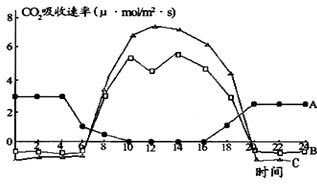如图为A、B、C三类植物在晴朗夏季的光合作用日变化曲线,请据图分析并回答:

(1)A植物在夜间能产生ATP的场所有____________。该植物夜间能吸收CO2,却不能合成糖类等有机物的原因是____________。
(2)A植物在10~16时不吸收CO2的直接原因是____________此时____________(填“能”或“不能”)进行光合作用的碳反应。据图推测该植物生活在____________的环境中。
(3)C曲线与横坐标的交点代表的意义是____________。
参考答案:
(1)细胞质基质和线粒体;没有光照,光反应不能进行,无法为碳反应提供NADPH和ATP
(2)气孔关闭;能;高温干旱
(3)C植物的光合作用速率等于呼吸作用速率
解析:
(1)A植物夜间无法进行光合作用,产生ATP的场所只有细胞质基质和线粒体。A植物夜间能吸收CO2,却不能合成糖类等有机物是因为没有光照,光反应不能进行,无法为碳反应提供NADPH和ATP。
(2)A植物在10~16时由于高温,气孔关闭,CO2吸收量降低,此时仍可以进行光合作用的碳反应,据图可推测该植物生活在高温干旱的环境中。
(3)C曲线与横坐标相交时,CO2吸收速率为0,此时C植物的光合作用速率等于呼吸作用速率。
